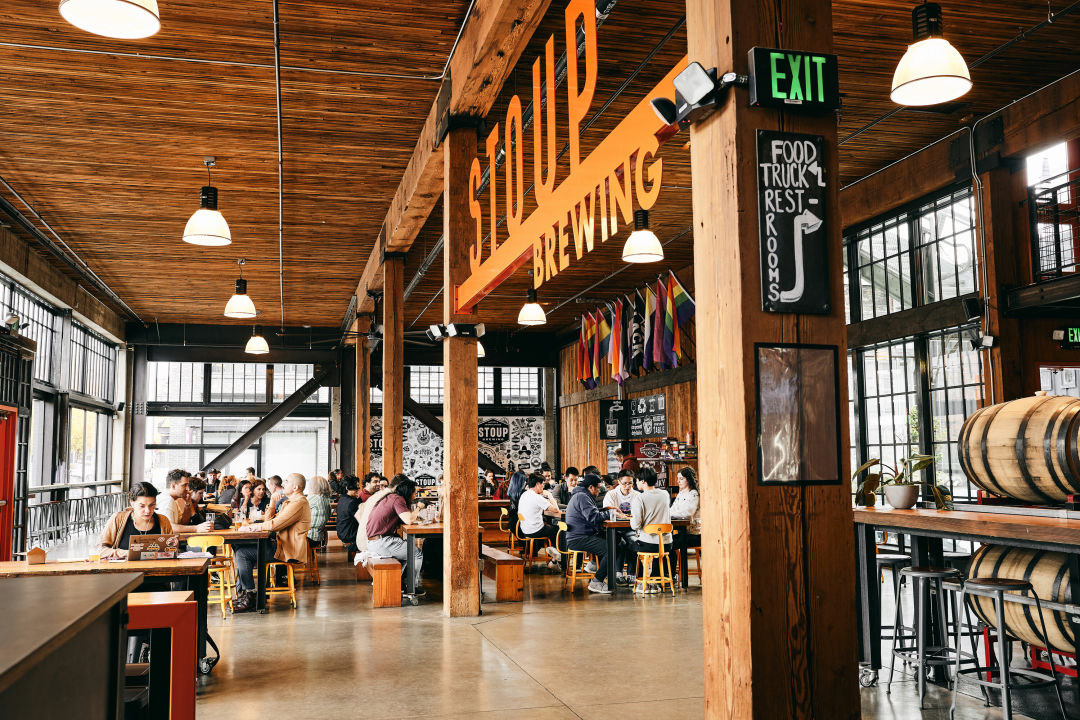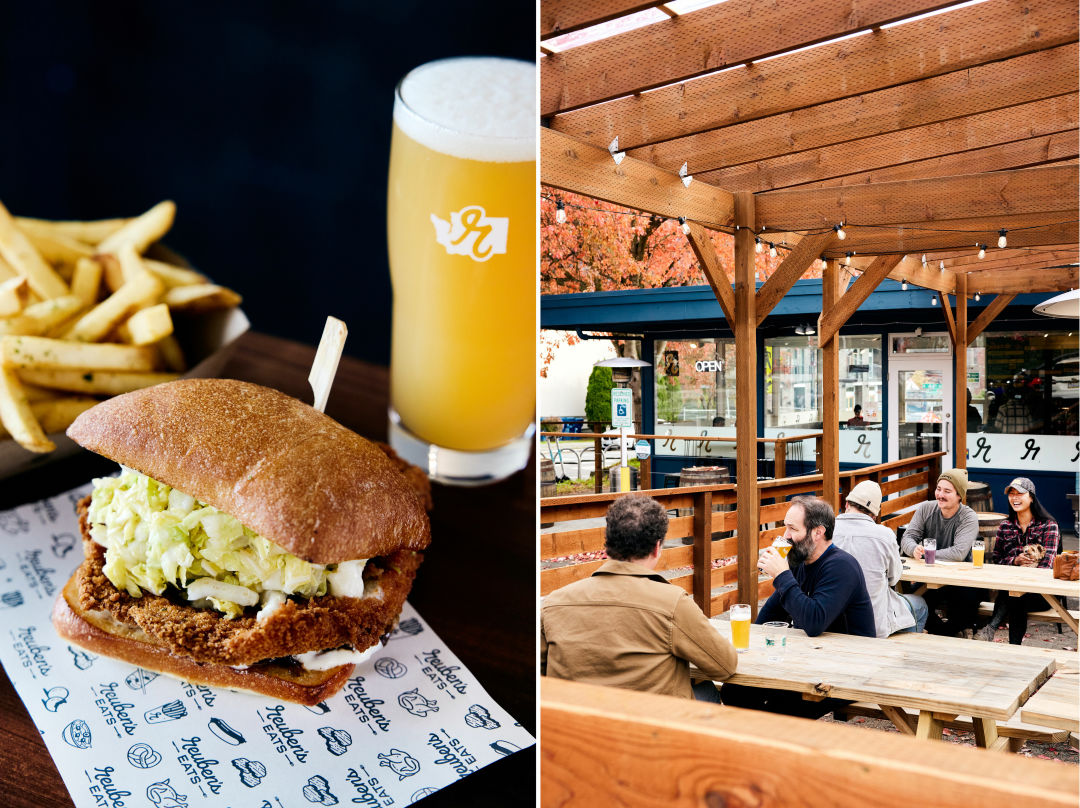Are Taprooms the New Seattle Coffee Shops?

This summer, Stoup took over the former Optimism Brewing on Capitol Hill.
Image: Amber Fouts
One recent Sunday, one end of Stoup Brewing’s new location was given over to a celebration of life service. Maybe 200 people were gathered there, but around the corner, on the other side of the brewing equipment, a much younger group had rearranged the brewery’s long tables and brought in massive screens for gaming. Beyond that, the regular Sunday mah-jongg players were in full swing, kids explored the play area; dogs lounged next to their owners on the patio. Outside the enormous windows, food trucks perform a curbside changing of the guard.
Over the summer, Stoup took over the former Optimism Brewing on Capitol Hill. It helps that the brewery’s third location, originally a 1920 auto showroom, is roomy enough that a memorial service and a game-a-thon don’t get in each other’s way. But there’s something else happening here, too.
As the ranks of independent craft breweries swelled in Seattle—and the entire country—over the past decade, we saw the rise of the taproom. When the beer is good, people are happy to come drink it in a no-frills production space, minus the big screens and the menus of bar snacks that come with more traditional pub settings. It turned out to be a solid formula for building community. But Seattle is taking taprooms’ third place status to the next level.

Stoup taprooms have hosted everything from baby showers to celebrations of life.
Image: Amber Fouts
When Stoup opened its original brewery and taproom in Ballard in 2013, says co-owner and creative director Lara Zahaba, “the one-year-old birthday parties always surprised us, but we love them.” She also didn’t expect “the soccer team or the baseball team celebrations where the kids don’t really want to be there, but the parents do.”
We treat our local breweries like a combination coworking space, banquet hall, conference room, and day care (so much so that some breweries have added no-minors areas for customers who prefer their adult beverage in the company of adults). Historically these inadvertent public spaces cluster in neighborhoods like Ballard, Capitol Hill, or Georgetown. But recently they’ve rippled into neighborhoods that have plenty of affluent beer-loving customers, but fewer of the handsome old industrial buildings that typically attract breweries.
It's not an accident. In 2020, a change in state law expanded the number of locations a brewery can operate, from two to four. We’ve already seen Pike Brewing, Métier Brewing, Reuben’s Brews, Holy Mountain, and Future Primitive Brewing open or announce additional taprooms—aka drinking places that don’t contain brewing equipment. Others, like Old Stove and Stoup, have opened second breweries. It makes economic sense: margins are best on beer sold in your own taproom. Production costs are up and with so many good beers out there, it’s harder to get your stuff on store shelves or on a bar’s tap list.
Meanwhile, new breweries continue to edge into more residential enclaves like Ravenna, the Central District, and Maple Leaf. Chances are, Seattle’s particular brand of taproom culture is coming to a neighborhood near you, if it hasn’t already. This spread coincides with another shift in Important Seattle Beverages.

Just your typical brewery with regular Sunday mah-jongg players.
Image: Amber Fouts
The term “third place” was coined in a landmark book by sociologist Ray Oldenburg in 1989. The Great Good Place argued that our citizenry is better off when we have interstitial spaces that “host the regular, voluntary, informal, and happily anticipated gatherings of individuals beyond the realms of home and work.”
Third places can be taverns, cafes, even bookstores. In America, the phrase soon became synonymous with coffee shops. The year Oldenburg’s book came out, a Seattle-based company called Starbucks opened its 55th location—more than double its count from just two years earlier. Starbucks seized on the “third place” idea, designing its stores with fireplaces and comfortable chairs where people might discuss the issues of the day (or at least compare notes on their kids) over a seasonally flavored latte. Later came highly reliable Wi-Fi.
But at its annual investor day conference in 2022, the company introduced a new focus on “pick up stores, drive through-only, and delivery-only locations to meet Starbucks customers whenever and wherever they want.” The company is adding mobile ordering at its locations in airports and grocery stores. This all sounds like the opposite of a third place. According to Starbucks, they’re, uh, reimagining the concept and taking it digital.
Covid restrictions forced plenty of local coffee shops to discourage seating and make drinks to go. After so many months of social distancing (and barely visiting our second place, the office), the idea of popping open a laptop and lingering at our neighborhood coffee shop took some adjustment. Meanwhile taprooms had been there all along, with their large pandemic-friendly outdoor spaces and tendency (mostly) to accommodate our kids and dogs.

The Reuben's satellite taproom on Fremont Avenue pours 25-ish taps of beer, plus drinks like hard seltzer, hop water, cider, and even a nonalcoholic sour.
Image: Amber Fouts
Reuben’s Brews founder Adam Robbings grew up in north London, viewing pubs as a gathering place for the entire family, rather than adults-only booze lairs. As an adult in Seattle, he’d repair to his local coffee shop to play online chess. There weren’t really taprooms back then, he says. “The alternative was a brewpub, but that’s a restaurant—you don’t go to a restaurant to hang out.” He remembers things shifting when Fremont Brewing opened its new taproom in 2009. That winter, Robbings and his wife, Grace, went there to address their Christmas cards over a beer or two.
Three years later, the Robbingses launched their own brewery. The tiny taproom proved so popular, they eventually found a larger spot a few blocks away in the heart of the Ballard Beer District thrum. By then, Adam knew how customers used his space—“we specifically looked at plug sockets in specific places so that people could work from there.” In October, the brewery opened a satellite taproom on Fremont Avenue. Like the original it pours 25-ish taps of beer, plus drinks like hard seltzer, hop water, cider, even a nonalcoholic sour for people who don’t do gluten, or even alcohol. In Seattle, after all, breweries aren’t just for people who like beer.
But coffee clearly remains part of Seattle’s identity. More important, it’s in most of our bloodstreams. Danny Hanlon first heard about the concept of a third place during corporate coffee training early in his barista career. “I was so turned off,” he remembers. “It seemed like something Starbucks was cashing in on.” But when he and partner Tim Hayden opened their own shop, Analog Coffee, Hanlon realized, people really did need a place to gather. They built the space to encourage interaction, with the coffee bar in the middle of the room. “It was like a bar, you have to engage with the bartender,” says Hanlon, rather than just anonymously claiming a table.
Over 13 years, Analog customers have met, become friends, launched relationships. Real third place stuff. “That’s been a surprisingly rich and rewarding outcome of this business,” says Hanlon. During Covid, they carried on as best they could amid limited occupancy and restrictions on indoor dining. Customers, isolated in Capitol Hill’s density of apartments, needed that connection even more.
Analog didn’t fully reopen until early 2023. “It’s a complete return to form,” says Hanlon. “Everybody’s back.” When we talk, he ducks out of the shop to stand across the street, looking back on a front window filled with people: typing, journaling, reading, hanging out. Measures like mobile ordering might ratchet up efficiency (and profit) but the point, says Hanlon, is to spend time with customers so they don’t feel like “just one person in a queue.”
Not every place has the capacity to hold a memorial service or soccer banquet. But maybe the evolution of third place is less about which beverage they serve, and more about the measures they take (or don’t take) to encourage people to stick around. Or, as Oldenburg puts it in his book, maybe a third place is any place that makes a point to offer “shelter against the raindrops of life’s tedium.”




